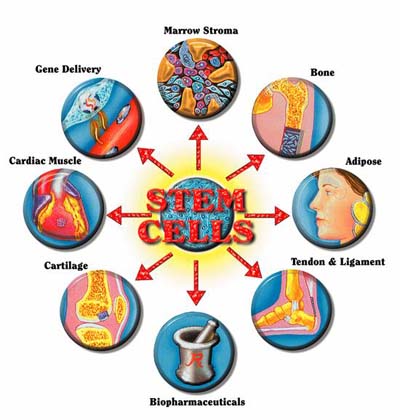To start off what is a stem cell? A stem cell is an
undifferentiated cell that has the capability to turn into any of the body’s
cells. They maintain the ability to divide and transform, throughout a person’s
life, into whatever cell is needed to replace a dead cell.
 (Source)
(Source)
But how does this
relate to cancer?
Recently researchers have
discovered something that they call a Cancer Stem Cell (CSC). A panel by the
American Association of Cancer Research defined it as “a cell within a tumor
that possesses the capacity to self-renew and to cause the heterogeneous
lineages of cancer cells that comprise the tumor,” (Article).
This discovery led to a new theory on the way cancer originates called “The
Cancer Stem Cell Hypothesis.” This Hypothesis states that “the
malignancies associated with cancer originate from a small population of
stem-like, tumor-initiating cells,” (Article).
This theory is also used to explain the severity of cancers and a potential
link to the metastatic ability of the cancers.
Figure
1 denotes how the first studies done with Leukemia demonstrate the discovery of
Cancer Stem Cells and one possible theory of their origin.
 (Source)
(Source)
“Figure 1
Initial
studies in leukemia provided the paradigm for the general CSC model. As shown
on the left side of the figure, a hematopoietic stem cell (HSC) gives rise to
normal progenitors and mature blood cells. The original model suggests that the
HSC undergoes mutation(s) that give rise to its malignant counterpart, the
leukemia stem cell (LSC). The LSC retains some degree of developmental
potential, generating the leukemia progenitor and leukemic blast cells, which
differ in their biological properties from the parent LSC. As in normal
hematopoiesis, the stem cell maintains the ability to undergo self-renewal and
thereby perpetuate the leukemia population.” (Article)
Another issue that is being debated is the formation of the Cancer Stem
Cells (CSC). If the only way a CSC can be formed if through a stem cell than it
brings into question the safety of Stem Cell treatments that are currently
being formulated. Thus, if Cancer Stem Cells do arise solely from already
existing stem cells, does it call into question the validity of Stem Cell
treatments? For example, there was a woman with spinal cord injuries that was
treated with a direct infusion of potent stem cells into the damaged area. This
treatment helped her regain her ability to walk (Article).
But, what if this injection
later causes her to develop a tumor in her spine that could not only paralyze
her but potentially kill her. There are many other treatments using stem cells
that could potentially be harmful to patients. However, there are always stem
cells in our body that could cause these cancerous formations as well. What
risk do our existing Stem Cells pose to us, and what is the chance that instead
of helping to renew our dying cells they will turn into cancerous cells?
The origin of the Cancer Stem Cells is not known. Researchers have many
ideas but until this discovery is made it will be impossible to determine the
effects of CSCs and how to stop them. Depending
on the origin of Cancer Stem Cells, from either Stem Cells, Progenitor cells,
or differentiated Cells, it could effect the way treatments take place. Also,
if CSCs did not originate directly from Stem Cells than there would be no worry
that treatments using Stem Cells would make the patient more prone to Cancer.
 (Source)
(Source)
Figure 2:
"How Do Cancer Stem Cells Arise? The molecular pathways that maintain "stem-ness" in stem cells are also active in numerous cancers. This similarity has led scientists to propose that cancers may arise when some event produces a mutation in a stem cell, robbing it of the ability to regulate cell division. This figure illustrates 3 hypotheses of how a cancer stem cell may arise: (1) A stem cell undergoes a mutation, (2) A progenitor cell undergoes two or more mutations, or (3) A fully differentiated cell undergoes several mutations that drive it back to a stem-like state. In all 3 scenarios, the resultant cancer stem cell has lost the ability to regulate its own cell division." (Article)
More research needs to be done to find what the real possibilities and
consequences are of Cancer Stem Cells. Researchers need to investigate
1)
If cancer
arises from Stem Cells, and if so how this occurs
2)
What the
origin of the Cancer Stem Cells are
3)
How to
use this information for new treatments
4)
If there
is a correlation between the presence of CSCs and prognosis of the patient (How
metastatic)
5)
The
impact on Stem Cell therapies
Once these questions are answered hopefully patients
will be able to receive more successful treatments that pinpoint the cause of
their problems and screenings for preventative measures.
Sources:
The Increasing Complexity of the Cancer Stem Cell
Paradigm
Jeffrey M. Rosen and Craig T. Jordan
Science 26 June 2009: 324 (5935), 1670-1673. [DOI:10.1126/science.1171837]

